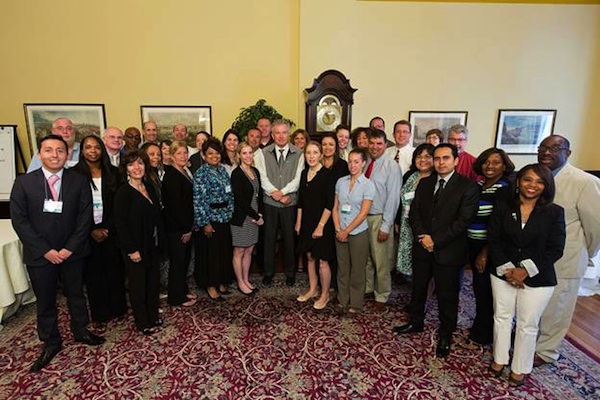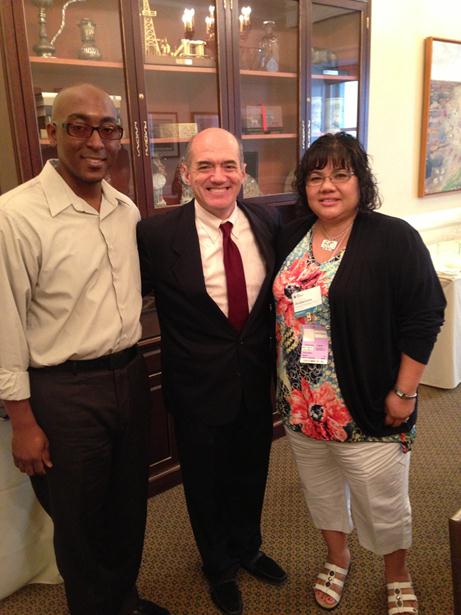Through the security protocols and then the elevators to the seventh floor, I made my way through the New York Stock Exchange (NYSE). It is always thrilling to be at their headquarters, one of the world's most important marketplaces.
I was invited back to the NYSE to speak to participants in a wonderful program they have hosted for the past 26 years, the NYSE Teachers' Workshop, where 35 of the top business and economics teachers had come together to strengthen teaching and learning. During four separate weeks over the summer, the NYSE invites teachers from across the country to New York City to spend five days learning about the stock market, financial markets, and trading -- so that they can bring this knowledge back to their classrooms. They use materials developed by the NYSE to teach young people about markets, prices, equities, bonds, and how the capitalist system works. I have had the pleasure of being a guest speaker for many years, and I always look forward to it all year long. To speak to my community -- business educators -- is a special treat for me.
As part of my presentation to the community of teachers, I spoke about the six things I think each young person needs to know about business.
1. Comparative Advantage: Each young person has a unique knowledge of time and space -- an idea for which Friedrich Hayek actually won the Nobel Prize. Helping a child find their advantage is, in my opinion, the most important goal of education. It is almost always based on what they love to do, or a hobby.
2. The Importance of Listening: This is one of the best ways to teach sales and marketing. Since the human brain is wired for different concepts, and if you can trigger one of these concepts, the others usually fall into place. Listening is a key concept.
3. The Power of Planning: It is so important to teach not only a history of business -- what has happened -- but, also how to plan for the future. As I have explained before, the entrepreneur is essentially a time traveler. They go into the future to see what people want, then come back to find the resources that makes up a product or service that meets a future need. Understanding time and risk is essential to understanding entrepreneurship and its uncertainties.
4. The Economics of One Unit: This is the building block of business. All business is broken down into units and prices. Understanding how much something actually costs and what the price should be in the market is absolutely crucial to success.
5. The Importance of Communications and the Media: Each child should learn their story so that they can communicate this story to the market, making it resonate with other human beings. Learning your story is self-awareness; the ability to communicate with other people is a way to tell them what your future will be.
6. The Importance of People:T ability to recruit people and work with people is crucial to achieving your mission. You must hire and subcontract in order to be successful.
Afterwards, I spoke with two of the participating teachers from the NYSE Teachers Workshop: Eugene Pope (EP), from Chicago, who was actually NFTE's Teacher of the Year a few years ago; and Christina Conley (CC), from Oklahoma City, who has been teaching for 19 years and works primarily with a Native American population struggling with poverty and unemployment.
Why is financial literacy so important to young people today?
EP: Typically, the students in my program are the forgotten students who have predetermined that they can't do math or can't read. In the process of putting together a business plan, their eyes open, seeing that they can do the ROI and many things mathematically, especially algebra, and they begin to flourish.
CC: I saw students struggling in math and other studies, and I wanted to help them to gain confidence in math, stay in school and improve in their academics before going to high school.
Why are some kids not able to learn math?
CC: Perhaps, they are not able or willing to. I think kids get to a certain point where they start to struggle and when they get home, their parents don't have the knowledge or resources to help.
Should financial literacy be required learning in school systems?
EP: Yes, it should be required if we're trying to remedy poverty. Financial Literacy has a lot to do with personal finances: many students are living in poverty because there is a lack of financial understanding in families and neighborhoods.
What is/has been the highlight of the NYSE Teachers' Workshop?
EP: As a project-based teacher, action is key -- learning how the NYSE works helps to create a lesson that works. For example, the wholesale experience is applicable -- actual trading, bidding for supplies, selling, creating another event based on that experience, etc., gives a better understanding of the stock exchange.
What is your best lesson in our field?
EP: The best part of NFTE is the presentation. It increases confidence, gives students a vision, helps them to understand the financial literacy component through various components such as preparing for the wholesale trip.
How will you incorporate the tools and knowledge you have learned from the NYSE Teachers Workshop into your classroom?
EP: I will be able to take the tools and knowledge that I have learned back into the classroom to help students visualize that they are actually at the NYSE. By teaching students the real world application of learning how to calculate the DOW and compare it to what's going on in their community and beyond that -- it will help them 'demystify' the stock market.
Later, Mr. Pope spoke eloquently about the wholesale trip and whether this particular experience changed a student's savings to consumption ratio, something which I have always felt was the key concept to ending poverty. He emphasized how NFTE taught youth a vocabulary about ownership and business.
Every person in the world needs to learn about how capital-the savings of others -- is raised by business people and entrepreneurs. NYSE is a world leader in this work and there's no better organization to teach our entrepreneurs, teachers and students about its significance. I had a wonderful time learning from these teachers and presenting to my colleagues in the profession, and hopefully I will be invited back next year.

From left to right:
Row 1:, Jhonatan David Franco Ospina, Josephine Hagood, Laurie Schoenig, Betty Chism, Jo Ann Bonfante, LaFrance Carpenter, Rosa Lamb, Duncan Niederauer - CEO of NYSE Euronext, Phyllis Giglio, Samara Fluster, Giovanny Moreno, Bonita Adams
Row 2: Bruce Thames, Kevin O' Keefe, Eugene Pope, Marcia McAllister, Keri Giannoti, Debra Jacoby, Anthony Sargent, Jennifer Lorance, Ray Henderson, Christina Conley, Kay Johnson, Donald Wharton
Row 3: Brian Nelson, Andrew Heady, Shane Messinger, Shirley Matherly, Caren Comeau, Sherry Atta, Thomas Dickey, James Watts, Fran Webbe, Peter Crowley

NFTE Teacher Eugene Pope (Chicago), Steve and Teacher Christina Conley (Oklahoma City)
